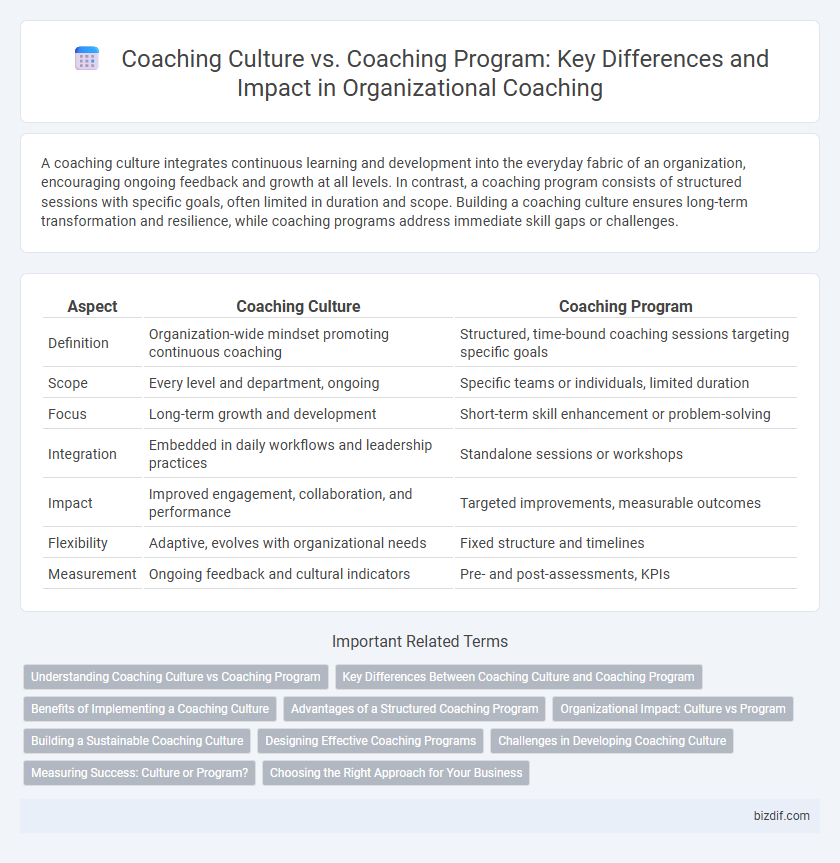A coaching culture integrates continuous learning and development into the everyday fabric of an organization, encouraging ongoing feedback and growth at all levels. In contrast, a coaching program consists of structured sessions with specific goals, often limited in duration and scope. Building a coaching culture ensures long-term transformation and resilience, while coaching programs address immediate skill gaps or challenges.
Table of Comparison
| Aspect | Coaching Culture | Coaching Program |
|---|---|---|
| Definition | Organization-wide mindset promoting continuous coaching | Structured, time-bound coaching sessions targeting specific goals |
| Scope | Every level and department, ongoing | Specific teams or individuals, limited duration |
| Focus | Long-term growth and development | Short-term skill enhancement or problem-solving |
| Integration | Embedded in daily workflows and leadership practices | Standalone sessions or workshops |
| Impact | Improved engagement, collaboration, and performance | Targeted improvements, measurable outcomes |
| Flexibility | Adaptive, evolves with organizational needs | Fixed structure and timelines |
| Measurement | Ongoing feedback and cultural indicators | Pre- and post-assessments, KPIs |
Understanding Coaching Culture vs Coaching Program
A coaching culture integrates coaching principles into daily organizational practices, fostering continuous growth and collaboration across all levels. In contrast, a coaching program offers structured, time-bound sessions aimed at developing specific skills or addressing targeted challenges. Understanding the difference enables organizations to choose between embedding coaching as a core value or implementing discrete training initiatives.
Key Differences Between Coaching Culture and Coaching Program
A coaching culture integrates continuous development and feedback at all organizational levels, fostering collaboration and growth, while a coaching program is a structured, time-bound initiative targeting specific skills or leadership qualities. Coaching culture promotes long-term behavioral change through consistent practices embedded in company values, whereas coaching programs focus on short-term performance improvements aligned with business objectives. Organizations with a coaching culture experience higher employee engagement, retention, and adaptability compared to those relying solely on isolated coaching programs.
Benefits of Implementing a Coaching Culture
Implementing a coaching culture fosters continuous employee development by embedding coaching principles into everyday interactions, leading to enhanced performance and engagement across all organizational levels. Unlike a coaching program, which is often limited in scope and duration, a coaching culture promotes sustained growth, adaptability, and improved leadership capabilities. Organizations with a coaching culture experience higher retention rates, increased innovation, and measurable improvements in team collaboration and productivity.
Advantages of a Structured Coaching Program
A structured coaching program provides clear goals, consistent methodologies, and measurable outcomes, which significantly enhance employee development and organizational performance. Unlike a general coaching culture, a defined program ensures accountability, standardized training, and scalable growth opportunities across teams. This approach accelerates skill acquisition and aligns coaching with strategic objectives for tangible business results.
Organizational Impact: Culture vs Program
A coaching culture embeds continuous learning and development at all organizational levels, driving sustainable employee engagement, innovation, and performance improvement. In contrast, a coaching program functions as a structured, time-bound initiative that develops specific skills or leadership capabilities but may lack lasting influence without cultural integration. Organizations with a coaching culture experience higher resilience and adaptability, whereas those relying solely on coaching programs often face limited impact beyond the program's duration.
Building a Sustainable Coaching Culture
Building a sustainable coaching culture integrates continuous learning, leadership commitment, and open communication, embedding coaching mindsets into daily practices across the organization. Unlike a coaching program, which offers structured, time-limited interventions, a coaching culture fosters ongoing development and empowerment at all organizational levels, driving long-term performance and employee engagement. Effective coaching cultures leverage peer coaching, leadership modeling, and feedback loops to create a resilient environment where coaching becomes a natural part of the company's DNA.
Designing Effective Coaching Programs
Designing effective coaching programs requires integrating a coaching culture that supports continuous learning and development at all organizational levels. A coaching culture fosters trust, open communication, and accountability, creating an environment where coaching programs can thrive and deliver measurable performance improvements. By aligning coaching programs with organizational goals and embedding them into daily workflows, companies ensure sustained employee engagement and skill enhancement.
Challenges in Developing Coaching Culture
Developing a coaching culture faces challenges such as resistance to change, lack of leadership support, and inconsistent coaching skills across the organization. Unlike a coaching program, which is a structured and time-bound initiative, a coaching culture requires ongoing commitment and integration into daily practices. Overcoming these barriers demands clear communication, executive endorsement, and continuous training to embed coaching values deeply within organizational behavior.
Measuring Success: Culture or Program?
Measuring success in a coaching culture centers on sustained behavioral changes and employee engagement metrics, reflecting long-term organizational growth and adaptability. In contrast, assessing a coaching program primarily involves evaluating participant feedback, skill acquisition, and short-term performance improvements. Organizations focused on continuous development benefit from tracking culture-driven outcomes, while those implementing specific initiatives may rely on program-specific data for immediate impact analysis.
Choosing the Right Approach for Your Business
A coaching culture integrates ongoing development into the organizational fabric, fostering peer-to-peer learning and continuous growth, while a coaching program offers structured, time-bound interventions targeting specific skills or goals. Businesses aiming for long-term transformation benefit from cultivating a coaching culture that promotes sustained engagement and adaptability. In contrast, companies with immediate skill gaps or project-based needs may find focused coaching programs more effective for rapid, measurable outcomes.
Coaching Culture vs Coaching Program Infographic

 bizdif.com
bizdif.com